As a member of global networks I have realized that the change that needs to happen in the world will only become reality, if cross-institutional actors support each other in co-creating a better future. Whether it is working towards a regenerative economy, mitigating climate change or empowering people to shape their future, there will always be many pathways to sustainability. Collective Stewardship is the pro-active and collaborative engagement for sustainability transformations by many complementary actors. Together, they foster transformation networks, mutually supportive strategies and multiple pathways to enhance patterns of socio-ecological systems aliveness. It is anchored in a sense of responsibility for safeguarding planetary and human wellbeing at all levels of the global society. Collective stewardship honors the world as an interconnected system.
Collective Stewardship is the pro-active and collaborative engagement for sustainability transformations by many complementary actors
Petra Kuenkel; Stewarding Sustainability Transformations
Stewarding sustainability transformations is a new way of how humankind can learn to responsibly operate with each other and the planet in the Era of the Anthropocene, the time in the planetary history where the human footprint has begun to change the course of planetary evolution. This requires mind-shifts in how individuals enact their leadership roles in the spirit of collaborative co-creation and contribution to sustainable futures. It is a pathway to the transformation literacy we need to acquire. Understanding systems aliveness and its patterned composition is central to implementing collective stewardship of sustainability transformations as a new way of partnering with evolution. It means taking care of systems aliveness at all levels of the global society. It is an ethical stance based on reverence for the world as an interconnected system. Collective stewardship fosters strategies and activities that are likely to achieve socio-ecological systems aliveness.
Transformation literacy is the skill of a collective of actors to steward transformative change collectively across the boundaries of institutions, nations, sectors, and cultures. This works best when change agents model evolutionary process and understand how patterns of aliveness emerge in human systems, but also in socio-ecological systems.
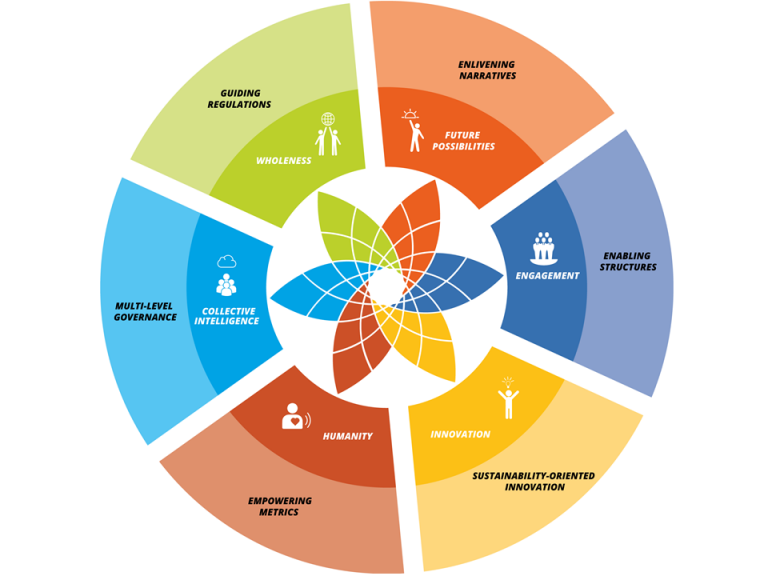
In the large systems change needed to shift collective behavior change towards regenerative systems it helps to pay attention to six transformation enablers that mirror life-enhancing principles and the human competency dimensions of the Collective Leadership Compass. The transformation enablers are more than factors. They need to be seen as a pattern of strategy elements, where the different elements support each other. If enablers are combined with other enablers in a patterned relationship, the likelihood of achieving impact increases, which most often manifests as increased systems aliveness. The six transformation enablers are: enlivening narratives, enabling structures and procedures, sustainability-oriented innovation, multi-issue, multi-level governance, guiding regulation and resource allocations, and empowering metrics.
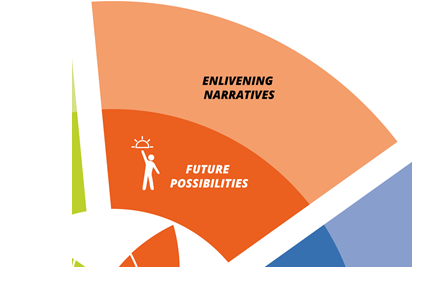
While sustainability doomsday scenarios wake up people to think and act, future narratives work best when they are emotionally contagious. They must encourage people to act. A sufficient dose of a ‘Yes We Can’ mentality is needed for the design of transformative change processes. Sustainability transformation needs uncounted numbers of emotionally compelling goals to get the many actors engaged that are needed.
| Enlivening Narratives | What is the emotionally compelling narrative that speaks to actors who need to change their behaviour? How do we create resonance for change? |
| Transformative process designs | Foster stories of possibilities. Create narratives that inspire minds and hearts. |
| Related Compass Dimensions | FUTURE POSSIBILITIES. |
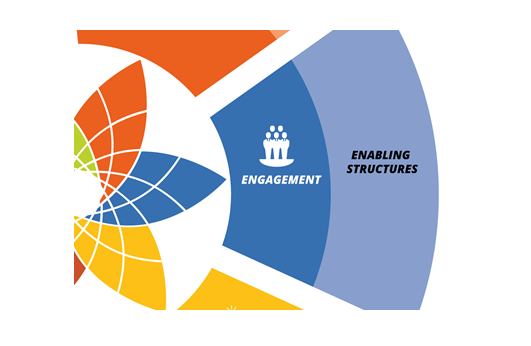
Enabling structures and well-organized processes can bring out the best in people and invigorate the human spirit. This might range from ‘reinventing organization’ to improving good governance mechanisms or fostering local and global networks. The current societal and organizational machine-like command-control structures may have a role, but need to be overcome where they stifle self-organization and multiple forms of organizing human interaction. Transformative change processes need to preserve structures where necessary and open up dynamic processes where possible.
| Enabling Structures and Processes | How can we bring stakeholders together in a climate of collective action? How can we leverage the potential of networks for dynamic change? |
| Transformative process designs | Build dynamic networks. Co-create structures that empower and enhance self-organization. |
| Related Compass Dimensions | ENGAGEMENT. |

Connecting transformative change with the emerging innovation movement is paramount. Change processes need to tap into the potential of bottom-up innovations to guide human inventiveness towards sustainability. This means amplifying emerging solutions and looking at how investments can be channelled towards life-enhancing social and technological advancements.
| Sustainability-oriented Innovation | Which innovations are happening and need to be supported? How do we nurture emerging potential and foster pioneering approaches? |
| Transformative process designs | Allocate space and support for prototyping technological and social innovations. |
| Related Compass Dimensions | INNOVATION |
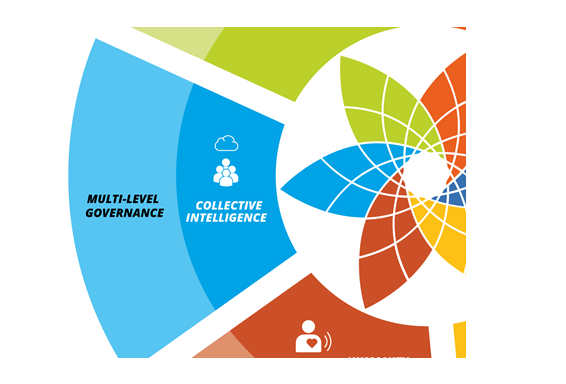
The purpose of governance in stewarding sustainability transformations is to accelerate collective sense-making and collective co-creation processes that further behavior change. Governance refers to multiple ways of collectively steering societies, local communities, or even global issues, either towards agreed-upon goals or away from danger. Multi-stakeholder compositions, and the participation of various societal groups in policy-developing and decision-making are increasingly seen as important for addressing complex societal or global challenges. Transformative systems designs work with patterns of governance, and move the concept of governance beyond negotiated compromises towards co-creative collaboration and learning settings.
| Multi-level Multi-Issue Governance | How do we establish structured dialogue and negotiate future pathways? Which forms of governance strengthen bottom-up and top-down transformation processes? How do we leverage multiple perspectives and expertise? |
| Transformative change | Establish new forms of collective sense-making and collective co-creation with multiple stakeholder |
| Related Compass Dimensions | COLLECTIVE INTELLIGENCE |
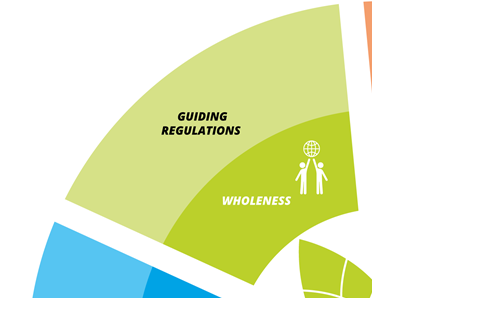
The role of guiding regulations and resource allocations is to safeguards life’s integrity at all levels. Without setting rules transformation to sustainability does not move forward. Guiding regulations are as powerful as deliberate interventions into the way resources are allocated, access is managed, taxes are distributed or investments are focused. But evenly important are voluntary frameworks and peer-reviewed standards that guide collective behavior change. Transformative systems designs carefully consider a combination of voluntary and binding agreements.
| Guiding regulations and balancing resource allocations | How do we co-develop and agree on behavioral guidance? How do we manage the flow of resources? How do we ensure impact at scale? |
| Transformative change | Set both voluntary and binding rules. Reallocate resources to sustainability. |
| Related Compass Dimensions | WHOLENESS |
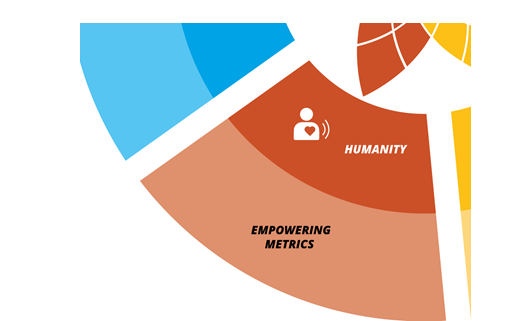
The rule applies: what gets measured gets improved. The focus on facts and figures needs to be science and evidence based, but also resonate with people and emotionally connect with them. Sustainability metrics, most importantly, need to empower actors at multiple levels to shift thinking and behavior. Metrics need to be owned and co-developed by those actors who are implementing change. Transformative systems designs consider how metrics function as feedback systems for iterative learning.
| Empowering Metrics | How do we raise awareness for change? How do we develop meaningful and participatory measurements of progress? Which metrics increase transparency and empower behaviour change? |
| Transformative process designs | Create bottom-up or co-developed collective feedback systems for iterative learning. |
| Related Compass Dimensions | HUMANITY |
Any of the transformation enablers can become an entry point for stewarding transformative change collectively. But it is their combination that makes a transformative system design impactful and accelerates large systems change. The six enablers provide meta-level conceptual guidance for designing large-scale change for sustainability transformation. How they are enacted is context and issue specific. They do not prescribe specific actions, but guide actors to adopt and connect measures and actions that, in the end, invigorate more sustainable patterns of socio-ecological interaction. They strengthen actors to understand the current situation and the opportunities for complementary intervention; guide them to plan relational and reciprocal interventions and encourage them to measure progress within a larger transformation system.
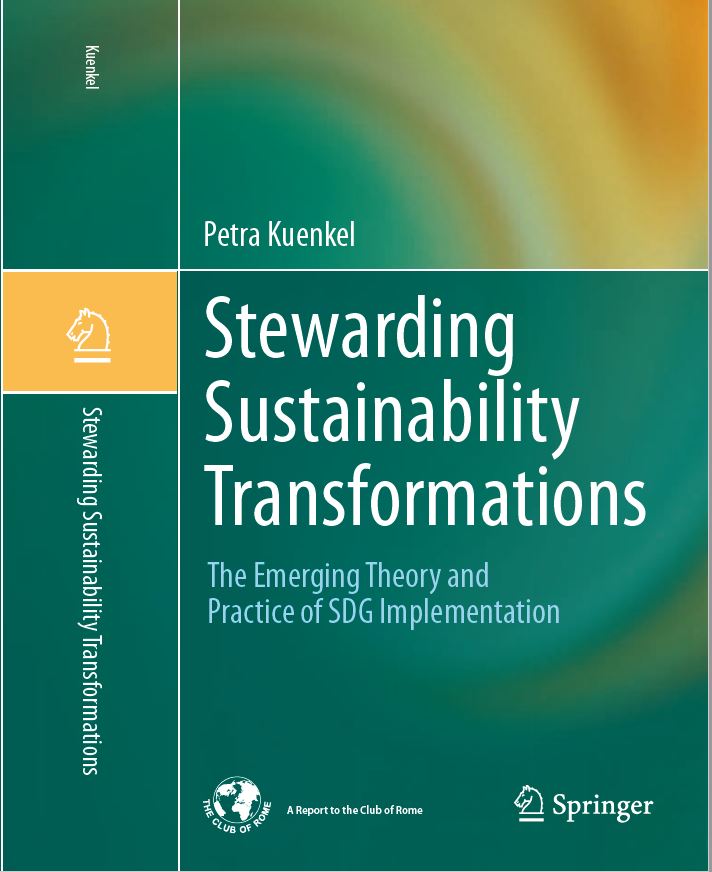

The overarching aim of this book is to translate a systemic – and enlivening – worldview into the practice of stewarding transformative change for sustainability. It connects the emerging practice of collaboration between multiple stakeholders with the call for a new way of seeing the world and ourselves as part of nature. In that way, this book ’s intention is civilizational. My hope is to contribute to bridging the gap between the so urgently needed renewed way of seeing the world as an interconnected whole and the practice of tangible action, for example, in climate change mitigation, integrated water resource management, poverty alleviation, renewable energy development, land restoration, or even in changing our economic system toward a regenerative economy.
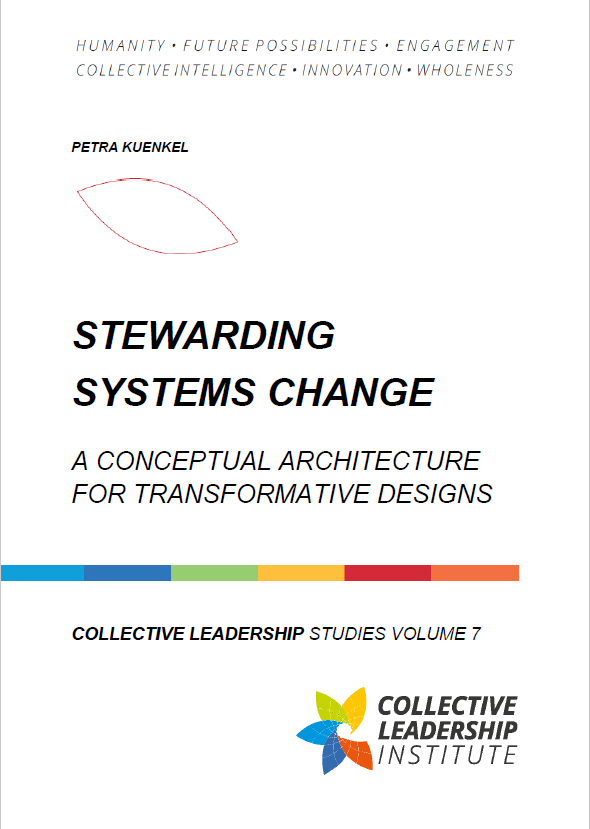
“Stewarding Systems Change – A Conceptual Architecture for Transformative Designs”- This Volume 7 of the Collective Leadership Studies argues that systems change is the intention of billions of activists, change agents, game-changers, and ordinary people. They need to expand their competency to steward transformations collectively. Based on the Collective Leadership Compass, this volume proposes a conceptual architecture for transformative change designs in large systems that cuts through the complexity of change initiatives by bringing human beings back to where they belong: into the center of attention of systems change, and into their emotional connection with an aspiration for a sustainable and interdependent world.
Citation: Kuenkel P. (2018). Stewarding Systems Change – A Conceptual Architecture for Transformative Designs, Collective Leadership Studies Vol. 7, Collective Leadership Institute: Potsdam/Germany, ISSN 2569-1171.
Download here.
